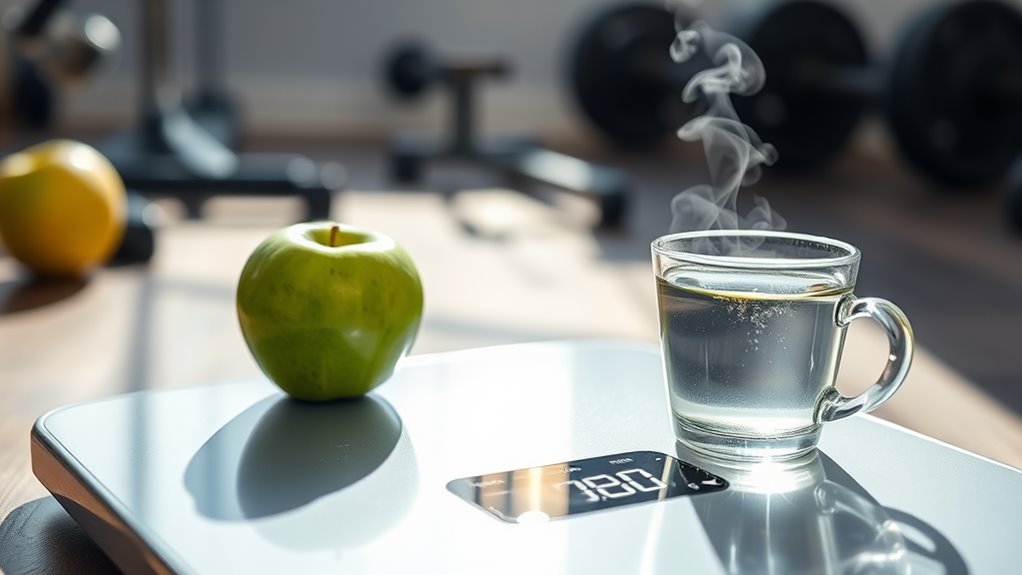Water Weight vs. Fat Loss – Are You Losing the Right Weight.
Are you feeling frustrated with the number on the scale? It’s easy to get caught up in water weight versus fat loss, especially when those numbers can change daily. Sometimes, what you think is progress might just be temporary water retention from your last meal or workout. So, how do you really know if you’re losing the right weight? Let’s break it down and explore what truly matters on your journey to a healthier you.
Understanding Water Weight: Causes and Effects
When you step on the scale and see a number that doesn’t match the hard work you’ve put into your fitness journey, it can be frustrating—especially if that number seems higher than expected.
You might wonder if it’s water weight vs fat that’s causing this discrepancy. Water weight can fluctuate daily due to factors like diet, salt intake, and hydration levels.
If you’ve increased your carb intake or had a salty meal, your body might retain extra water, affecting that scale number.
Remember, this doesn’t mean you aren’t making progress! Focus on how you feel, your energy levels, and how your clothes fit, rather than just the number on the scale.
Your body’s journey is about more than just weight.
The Science of Fat Loss: What Happens in Your Body
As you dive into the science of fat loss, it’s important to understand that your body is constantly working behind the scenes to manage energy stores.
When you consume fewer calories than you burn, your body taps into fat reserves for energy, breaking down fat cells and releasing stored energy. This process involves hormones, enzymes, and even your metabolism revving up like a car engine.
You might feel frustrated when the scale doesn’t budge, but remember that fat loss isn’t always linear. Sometimes, your body holds onto water or adapts by slowing metabolism.
How to Differentiate Between Water Weight and Fat Loss
How can you tell if that number on the scale is really showing fat loss or just a fluctuation in water weight?
First, pay attention to how your clothes fit and your body measurements; they often reveal changes that the scale can’t.
Also, keep track of your weight over time instead of daily. If your weight drops quickly, it’s likely water weight.
Next, notice how you feel—real fat loss usually comes with increased energy and improved mood.
Lastly, if you’ve recently upped your salt intake or had a cheat meal, those can lead to temporary water retention.
The Impact of Diet and Exercise on Weight Loss
Diet and exercise play a crucial role in your weight loss journey, and understanding their impact can make all the difference.
When you focus on eating nutritious foods, like fruits and veggies, and steer clear of processed snacks, you set yourself up for success.
Exercise, whether it’s a brisk walk or a fun dance class, helps burn those calories and builds muscle, which can boost your metabolism.
Remember, it’s not just about losing weight; it’s about feeling good and building healthy habits.
You might hit a few bumps along the way—like those pesky cravings or a busy schedule—but don’t let that discourage you.
Stay consistent, find activities you enjoy, and celebrate your progress, no matter how small.
You’ve got this!
Tracking Your Progress: Metrics That Matter
Tracking your progress is a vital part of any weight loss journey, and it can actually be pretty motivating when you see how far you’ve come. Instead of just focusing on the scale, consider tracking different metrics that provide a clearer picture of your success.
Here’s a quick look at some important metrics:
| Metric | Why It Matters |
|---|---|
| Weight | Basic measure of overall progress |
| Body Measurements | Helps show fat loss beyond the scale |
| Fitness Levels | Tracks improvements in strength and stamina |
| Energy Levels | Reflects overall well-being and health |
| Mood and Motivation | Keeps you focused and engaged |





